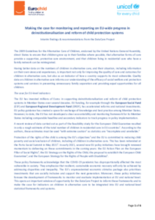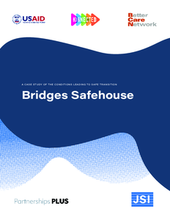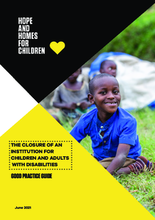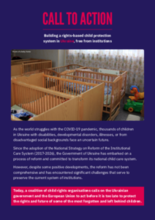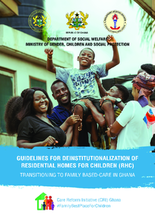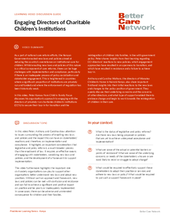Displaying 121 - 130 of 691
The DataCare Project seeks to map how EU Member States and the UK currently collect data on the situation of children in alternative care. This report presents the interim findings of this project, based on the analysis of 14 countries who participated in the study at the end of 2020.
This case study highlights some of the prerequisites for the starting point of a successful transition from residential care to a non-residential model, many of which are often overlooked or underestimated. The case study is organized around the various stages of transition and explores some of the key themes outlined in the Transitioning Models of Care Assessment Tool.
This document outlines 5 key steps that serve as an effective blueprint for a successful reintegration process of children and disabilities. These include ‘engagement’, ‘Assessment’, ‘Design & Development’, ‘Transition’, and ‘Monitoring & Evaluation’.
This call to action - issued by a coalition of child rights organisations including Hope and Homes for Children, Lumos, Eurochild, and SOS Children's Villages - calls on the Ukrainian government and the European Union to "act before it is too late to protect the rights and future of some of the most forgotten and left behind children."
By drawing on the experiences of parents, advocates, NGOs, and public officials, this side event invited discussion on how, through strengthening families and tools for prevention, societies can reduce the number of children being institutionalized. During the event, a panel of experts from the Republic of Moldova, South Africa, Burkina Faso, Vietnam, and the United States explored their experiences around efforts to empower parents and keep children with disabilities with their families.
The India Alternative Care Network (IACN) held a website launch event on 21 October 2020.
This document is aimed at complementing the Standard Operating Procedures (SOPs) for Licensing, Monitoring and Closure of Residential Homes for Children (RHC) by supporting the implementation of the closure of RHCs that have not been licensed or do not meet the standards in the SOPs.
In this video, Peter Kamau from Child in Family Focus discusses his organisation’s approach to engaging with the directors of privately-run charitable children’s institutions (CCI’s) to secure their buy-in for transition and the reintegration of children into families, in line with government policy.
Comprised of videos and accompanying discussion guides, this video series features the learning from practitioners working across a range of care-related programs and practices in Kenya.
This book provides new and empirically grounded research-based knowledge and insights into the current transformation of the Russian child welfare system. It focuses on the major shift in Russia’s child welfare policy: deinstitutionalisation of the system of children’s homes inherited from the Soviet era and an increase in fostering and adoption.

